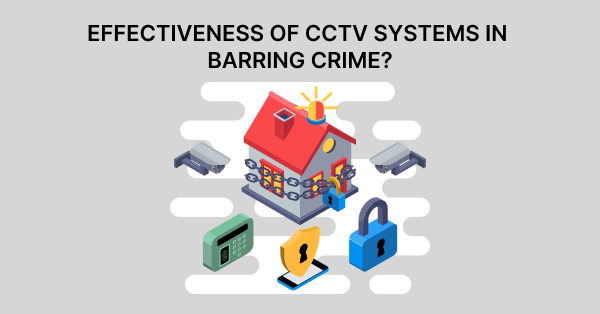
Understand the Effectiveness of CCTV Systems | Secure by CCTV
Discover how CCTV systems enhance security by deterring crime, assisting law enforcement, and providing valuable evidence. Explore their impact and effectiveness in crime prevention.
Introduction
Closed-circuit television, or CCTV, systems are being used for security purposes much more frequently. These systems use security cameras to continuously monitor particular areas visually. CCTV systems have grown to be a crucial instrument for boosting security because of their capacity to dissuade potential criminals and facilitate investigations. Their presence is a potent deterrent, and the sense of security they offer is derived from their real-time monitoring and recording capabilities. CCTV systems are always evolving, offering more features and better usability as technology progresses. Their extensive use in public areas and residential buildings attests to their efficacy in fostering security and discouraging criminal activity.
Benefits of CCTV Cameras
The installation of CCTV cameras is essential for improving security protocols and deterring criminal activity. Potential criminals are deterred by these surveillance systems’ continuous monitoring and recording of activities. CCTV cameras record in real time, giving investigators access to crucial evidence that helps identify and apprehend criminals. In addition to increasing public safety, their presence gives people a sense of security. CCTV systems are now more effective thanks to features like intelligent video analytics and facial recognition that were previously unattainable. In general, installing CCTV cameras makes places safer and more secure by acting as a proactive crime prevention measure.
Different Types of CCTV Systems
CCTV systems come in a variety of varieties to suit a range of uses and settings. First, video is recorded by analog cameras and sent to a video management system (VMS) or digital video recorder (DVR). Coaxial cables are used by these cameras to send video signals. Conversely, IP cameras function by digitally transforming video and sending it over an IP network. These cameras record video in higher resolution and are simple to integrate with other gadgets. In addition, there are weatherproof bullet cameras that can be used for outdoor surveillance, discreet dome cameras that are appropriate for indoor use, and PTZ (pan-tilt-zoom) cameras that can rotate, tilt, and zoom in for more coverage and flexibility.
There are also wide dynamic range (WDR) cameras that can handle different lighting conditions, thermal cameras that can identify heat signatures, and license-plate recognition cameras that can record information about a vehicle’s registration. While the functions of each type of CCTV system vary, they are all intended to improve security measures and offer surveillance in their respective environments.
Advantages & Disadvantages of CCTV Systems
CCTV systems are a great way to improve security because they have many benefits. They serve as a deterrent in the first place because the sight of cameras may dissuade would-be offenders. Second, CCTV footage can help identify suspects and offer important evidence in investigations. These systems also offer real-time surveillance and effective monitoring of wide areas. But it’s also critical to take the drawbacks into account. One common complaint is privacy, since many people view CCTV systems as an invasion of their personal space. Furthermore, there might be restrictions on coverage, visibility in dim light, and reliance on human monitoring. It’s also critical to dispel common misconceptions about CCTV, such as the idea that it can stop all crimes or that it’s constantly under constant observation. Finally, legal considerations need to be made, like getting permission to record in specific locations, adhering to data protection laws, and making sure that footage is retrieved and stored in accordance with legal requirements.
Effectiveness of CCTV Cameras in Crime Prevention
CCTV systems have shown to be very successful in preventing a variety of crimes, such as theft, break-ins, vandalism, and more. Visible surveillance cameras serve as a potent deterrent because they make potential criminals aware that their every move is being watched and recorded. CCTV cameras, for example, can deter employee theft and shoplifting in retail environments by raising the perceived risk of being caught in the act. Similar to this, the simple presence of CCTV cameras in residential areas deters potential burglars from targeting particular residences. Vandalism and other antisocial behavior are significantly decreased in public areas because CCTV footage can potentially identify offenders and have punitive effects.
CCTV systems provide recorded evidence that helps identify suspects and supports prosecutions, increasing the likelihood of conviction. Advancements in technology, such as night vision capabilities, high-resolution cameras, and remote monitoring, have made CCTV systems extremely effective tools for preventing and deterring different kinds of crimes, thereby making communities safer overall.
Benefits of Installing CCTV in High-crime Areas for Public Safety
In high-crime areas, installing CCTV systems can greatly improve public safety. Potential criminals are visibly deterred by these systems, which instills a sense of accountability and surveillance. Since people are aware that their activities are being watched and recorded, the presence of cameras can deter criminal activity. Furthermore, law enforcement agencies can identify and apprehend offenders with the help of CCTV footage. Understanding that surveillance systems are in place to watch over and safeguard their surroundings makes residents and visitors to high-crime areas feel more secure. Furthermore, CCTV systems’ real-time monitoring features enable prompt reaction and intervention in the event of any suspicious or illegal activity. Overall, by providing a constant watchful eye, CCTV systems play a crucial role in enhancing public safety in high-crime areas.
Limitations of CCTV Cameras
CCTV cameras have certain drawbacks and possible difficulties, even though they can be useful for security reasons. First off, the placement and coverage of CCTV cameras have a significant impact on their efficacy. There may be blind spots, or places outside the camera’s field of view, which makes some places open to criminal activity. Furthermore, in dimly lit areas, inclement weather, and in crowded spaces, CCTV cameras might not be able to record clear footage. The system’s dependability may also be impacted by maintenance and technical problems. Relying exclusively on recorded footage may cause action to be delayed, which presents another challenge. Human monitoring is still necessary to ensure prompt response to incidents. Another drawback is privacy concerns, as ongoing surveillance may lead to moral dilemmas and violate people’s right to privacy. Finally, effective data management, safe storage, and adherence to data protection laws are necessary for CCTV systems. To guarantee the efficient and moral application of CCTV systems for security, it is imperative to address these constraints and difficulties.
Conclusion
The use of CCTV cameras has been shown to be beneficial in lowering crime rates and improving general security. These cameras work as a deterrent, making potential criminals feel accountable and under observation, which keeps them from committing crimes. In addition to helping to deter crime, CCTV cameras provide important evidence for investigations, assisting law enforcement in locating and apprehending criminals. To guarantee the security and welfare of people and communities, CCTV cameras must be installed in homes, workplaces, and public areas. These cameras serve as watchful defenders, keeping an eye on the environment and facilitating quick action in case of emergency. They help create a safer atmosphere and give people a sense of security by offering a visual record of events.
